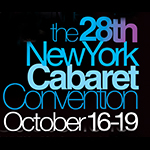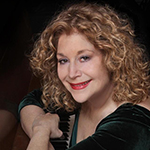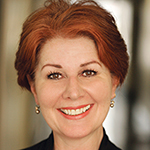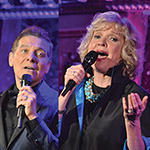Pretty Woman: The Musical
Nederlander Theatre, NYC, August 23, 2018
Reviewed by Elizabeth Ahlfors for Cabaret Scenes
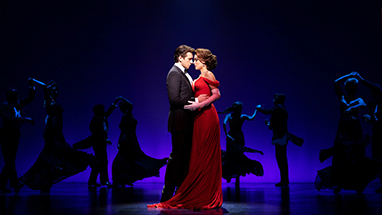
Photo: Matthew Murphy
Pretty Woman: The Musical joins the lineup of movies hoping to leap from popular romcom to dazzling Broadway musical legend. Sometimes it works out, sometimes not. At first glance, screenwriter J. F. Lawton’s film of a financial bigwig falling for a hooker-with-a-heart seems like a money-making go. It may well be just that. The talented leads, Andy Karl and Samantha Barks, have some memorable moments at the Nederlander Theatre as Edward Lewis and Vivian Ward. However, these are the impossible replacements in roles that in 1990 confirmed Richard Gere as a heart throb and recognized Julia Roberts as the streetwalker with a mile-wide smile that lights up the screen and a laugh explosive enough to ignite holiday fireworks. So, what’s the problem?
Some roles are irreplaceable, and this production of Pretty Woman misses Julia Roberts’ indelible Vivian. In her Broadway debut, Barks (the film of Les Misérables), as hard as she tries, is no Roberts, although she possesses expressive vocal power and a likable mix of vulnerability and pluck. Karl, a talented singer and actor (Rocky; Groundhog Day), is staid and desultory in his role as her love interest, corporate raider Edward.
Also missing is Roy Orbison and Bill Dees’ movie theme song, “Oh, Pretty Woman.” Opening the show, Eric Anderson as Happy Man leads the company in “Welcome to Hollywood” (“What’s your dream?”) as Vivian scrambles down the fire escape to avoid the landlord. In her first solo, she reveals her dream of a better life (“Anywhere but Here”). Hitting that mean street, Hollywood Boulevard, Vivian runs into Edward and offers to show him the way to his hotel—of course for a price. He proposes that she become his escort for a week. And so it goes with the familiar movie scenes: the Beverly Wilshire Hotel, shopping on Rodeo Drive, the polo match, the opera. During her week with Edward, Vivian realizes there are better ways to live than trolling the streets, and she decides “I Can’t Go Back.” Edward, as well, is helped to discover his softer side when Vivian steers him away from a planned sleazy business deal.
Alas, despite a few de-rigueur sex moments, money-hungry Karl and feisty Barks lack a sizzling chemistry. The show, however, is enlightened by performances by Karl’s real-life wife, dynamic belter Orfeh (Legally Blonde) as Kit, Vivian’s pal and mentor. She shows her bombastic power when she discovers the luxuries of “Rodeo Drive,” but, in the end, Kit decides to become a cop. Jason Danieley plays Philip Stuckey, Edward’s manipulative lawyer who propositions Vivian. She clocks him, proving she can take care of herself and is not some girl waiting for a man to come to her rescue. Anderson, besides his role as sleazy Happy Man, portrays a supercilious hotel manager, Mr. Thompson, who grows to admire Vivian’s open honesty and even teaches her to dance. Adding a peppy comic energy is the hotel’s elevator boy, Giulio (Tommy Bracco) who is also taken by Vivian’s street-smart vivacity.
The score by composer Bryan Adams and lyricist Jim Vallance adds country pop-rock vibrancy without much to remember in melodies or lyrics. The opera scene (where Vivian wears that legendary red dress) features Alfredo’s toast to Violetta (Allison Blackwell) in a duet of “Libiamo,” (Verdi’s La Traviata) competing awkwardly with Edward’s pop tune, “You and I” (“We got somethin’ goin’ on.”) Other songs, like Edward’s power ballad, “Freedom,” “On a Night Like Tonight,” and “Don’t Forget to Dance” have catchy melodies but forgettable lyrics.
Pretty Woman’s film director, the late Garry Marshal, lent a hand in writing the book with film screenwriter J.F. Lawton, following the path of the film and its dialogue and toggling songs into the storyline. Director Jerry Mitchell (Kinky Boots) does not update the book, but provides the show with a slick flow, flashy theatricality, an enthusiastic cast, and energetic choreography. Yet the production lacks the film’s fizzy spontaneity. The scenery by David Rockwell is tue to the streets of Hollywood in the 1990s, and Gregg Barnes’ costumes were aptly inspired by many of Marilyn Vance’s movie costumes—the red dress, the polka dot number in a new color, the bare midriff, the vinyl thigh-high boots.
The original Pretty Woman remains a TV draw, complete with the Roberts-Gere magic. But, unfortunately, despite the talented leads and cast, there is really not much fresh about this uninspired musical adaptation.


